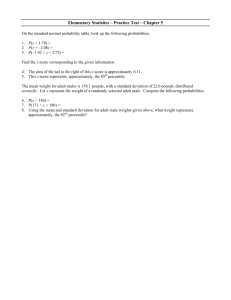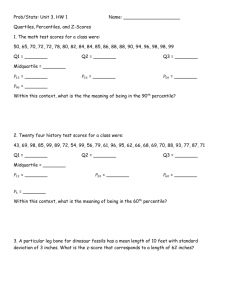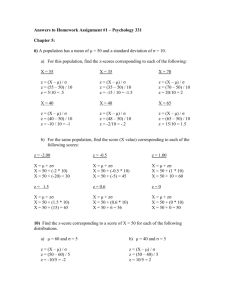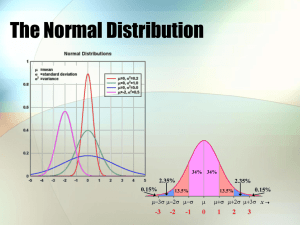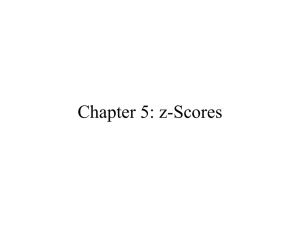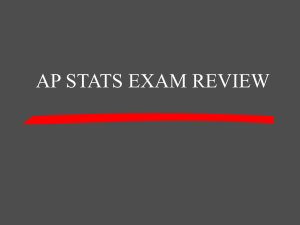Reviewing Normal Distributions and Z
advertisement
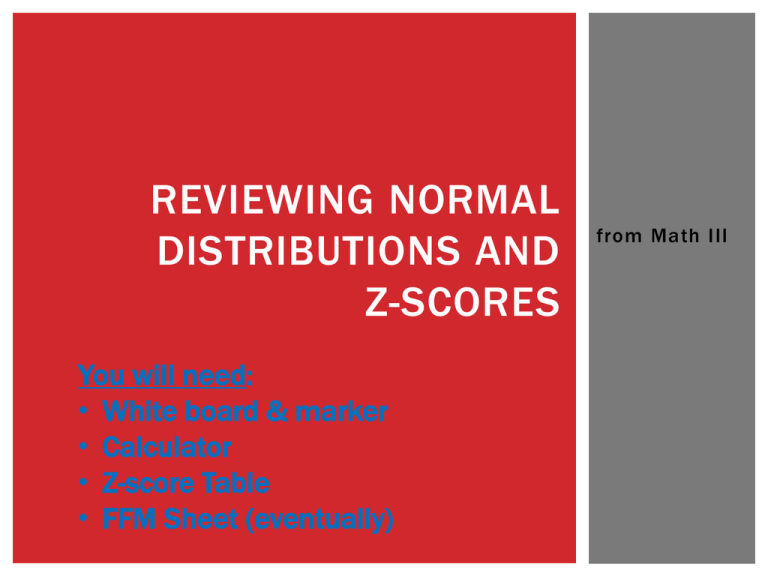
REVIEWING NORMAL DISTRIBUTIONS AND Z-SCORES You will need: • White board & marker • Calculator • Z-score Table • FFM Sheet (eventually) from Math III REMINDER: The Standard Normal Distribution is a normal distribution with a mean of 0 and a standard deviation of 1 . To more easily compute the probability of a particular observation given a normally distributed variable, we can transform any normal distribution to this standard normal distribution using the following formula: 𝑋−𝜇 𝑧= 𝜎 𝑋 = 𝑠𝑡𝑎𝑡𝑖𝑠𝑡𝑖𝑐 ; 𝜇 = 𝑝𝑎𝑟𝑎𝑚𝑒𝑡𝑒𝑟 ; = 𝑠𝑡𝑎𝑛𝑑𝑎𝑟𝑑 𝑑𝑒𝑣𝑖𝑎𝑡𝑖𝑜𝑛 When you find this value for a given value, it is referred to as the z-score. The z-score is a standard score for a data value that indicates the number of standard deviations that the data value is away from its respective mean. 1.) GIVEN A NORMAL DISTRIBUTION WITH A 𝜇 = 20 𝑎𝑛𝑑 𝜎 = 3, a.) What data value corresponds to a z-score of 1.5? 1.) GIVEN A NORMAL DISTRIBUTION WITH A 𝜇 = 20 𝑎𝑛𝑑 𝜎 = 3, b.) What data value corresponds to a z-score of −2.5? 2.) GIVEN A NORMAL DISTRIBUTION WITH A 𝜇 = 75 𝑎𝑛𝑑 𝜎 = 5, Calculate the z-score for: a.) X = 65 2.) GIVEN A NORMAL DISTRIBUTION WITH A 𝜇 = 75 𝑎𝑛𝑑 𝜎 = 5, Calculate the z-score for: b.) X = 90 2.) GIVEN A NORMAL DISTRIBUTION WITH A 𝜇 = 75 𝑎𝑛𝑑 𝜎 = 5, Calculate the z-score for: c.) X = 82.5 3.) GIVEN A NORMAL DISTRIBUTION WITH A 𝜇 = 75 𝑎𝑛𝑑 𝜎 = 5, Determine the X value which corresponds to the following z-scores: a.) Z = −𝟐. 𝟓 HINT: You will need to work backwards to find X…plug values into z-score formula and solve for x. 3.) GIVEN A NORMAL DISTRIBUTION WITH A 𝜇 = 75 𝑎𝑛𝑑 𝜎 = 5, Determine the X value which corresponds to the following z-scores: b.) Z = 0.75 HINT: You will need to work backwards to find X…plug values into z-score formula and solve for x. 3.) GIVEN A NORMAL DISTRIBUTION WITH A 𝜇 = 75 𝑎𝑛𝑑 𝜎 = 5, Determine the X value which corresponds to the following z-scores: c.) Z = 1.9 HINT: You will need to work backwards to find X…plug values into z-score formula and solve for x. 4.) GIVEN A NORMAL DISTRIBUTION WITH A 𝜇 = 75 𝑎𝑛𝑑 𝜎 = 5, Using the empirical rule, a.) what percent of the data falls between 𝒛 = − 𝟏 and 𝒛 = 𝟏 ? b.) what x-values would correspond to (a) to contain that same percentage of data? 4.) GIVEN A NORMAL DISTRIBUTION WITH A 𝜇 = 75 𝑎𝑛𝑑 𝜎 = 5, Using the empirical rule, c.) what percent of the data falls between 𝒛 = − 𝟐 and 𝒛 = 𝟐 ? d.) what x-values would correspond to (c) to contain that same percentage of data? 4.) GIVEN A NORMAL DISTRIBUTION WITH A 𝜇 = 75 𝑎𝑛𝑑 𝜎 = 5, Using the empirical rule, e.) What percent of the data falls to the LEFT of 𝒛 = 𝟎? 4.) GIVEN A NORMAL DISTRIBUTION WITH A 𝜇 = 75 𝑎𝑛𝑑 𝜎 = 5, Using the empirical rule, f.) What percent of the data falls to the LEFT of 𝒛 = 𝟑? 4.) GIVEN A NORMAL DISTRIBUTION WITH A 𝜇 = 75 𝑎𝑛𝑑 𝜎 = 5, Using the empirical rule, g.) What percent of the data falls to the RIGHT of 𝒛 = 𝟐? FFM 8/16/13: In a normal distribution with 𝝁 = 𝟒𝟎 and 𝝈 = 𝟓, 1.) find X if 𝒛 = −𝟎. 𝟒 2.) find P(𝒛 < −𝟎. 𝟒) = _____ 3.) P (𝒙 > 48.2) A.M. III HOMEWORK Section 9.2, pg. 588-590 # 9.20 #9.22 #9.24 #9.28
